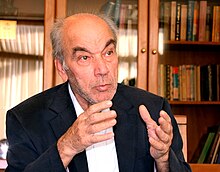Reza Davari Ardakani
Reza Davari Ardakani | |
|---|---|
 | |
| Born | 6 July 1933 Ardakan, Iran |
| Occupation | President of Academy of Sciences of Iran |
| Awards | |
| Era | 21st century Philosophy |
| Region | Western philosophy |
| School | Continental |
Main interests | Heidegger's philosophy Occidentalism |
Notable ideas | Criticism of the West |
Reza Davari Ardakani (Persian: رضا داوری اردکانی; born 6 July 1933, in Ardakan) is an Iranian philosopher who was influenced by Martin Heidegger, and a distinguished emeritus professor of philosophy at the University of Tehran. He is also the current president of the Iranian Academy of Sciences. He is known for his works on criticism of the Western Culture and thought.[2][3][4]

Life
Davari received primary and secondary education in Arkadan, and after leaving school became a teacher in 1951. In 1954, he entered the University of Tehran as an undergraduate, gaining a BA and in 1967 a PhD in philosophy there.[5] He is currently a professor of philosophy at Tehran University. From 1979 to 1981, he was dean at the faculty of literature and humanities, University of Tehran, and the head of Iranian National Commission for UNESCO from 1979 to 1982. Davari was the editor-in-chief of Farhang Journal.[6]
Davari and Abdolkarim Soroush have engaged in a series of philosophical debates in post-revolutionary Iran.[5][7]
See also
References
- ^ نشانهای دولتی در روزهای پایانی خاتمی و احمدینژاد به چهکسانی رسید؟. Tasnim News Agency (in Persian). 24 August 2013. Retrieved 15 April 2016.
- ^ Ramin Jahanbegloo Released in Iran:Reading Arendt in Teheran
- ^ Iranian Intellectuals and the West
- ^ A Comparative Investigation of Political Thoughts of Davari and Soroush Regarding the West
- ^ a b Şerif Mardi, Cultural transitions in the Middle East, 1994, BRILL, p. 238.
- ^ Davari's Life
- ^ Jacques Waardenburg, Muslims and others, 2003, Walter de Gruyter, pp. 491–2
External links
- People from Ardakan
- University of Tehran alumni
- University of Tehran faculty
- 1933 births
- Living people
- Islamic Azad University faculty
- Heidegger scholars
- Philosophy academics
- Existentialists
- 20th-century Iranian philosophers
- 21st-century Iranian philosophers
- Philosophers of culture
- Continental philosophers
- Phenomenologists
- Philosophers of nihilism
- Recipients of the Order of Knowledge
- Farabi scholars
- Iranian Science and Culture Hall of Fame recipients in Philosophy
- Faculty of Letters and Humanities of the University of Tehran alumni
- Academy of Sciences of Iran members
- Distinguished professors in Iran
- Distinguished professors of philosophy
- Asian philosopher stubs
- Iranian academic biography stubs
